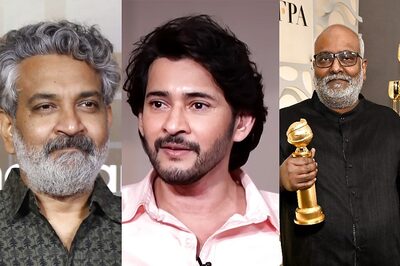
views
Washington: Pervez Musharraf has said he is not planning to resign or retire as Pakistan President despite his allies suffering a crushing defeat in the election. At the same time, he has also held out a veiled threat, saying any clash between the PM and President may lead to problem.
A day after pro-Musharraf PML-Q was hammered at the hustings, the former military ruler told The Wall Street Journal that he is neither contemplating retirement nor resigning and asserted that he intends to stay in office to guide the democratic transition in the country.
"No, not yet. We have to move forward in a way that we bring about a stable democratic government to Pakistan," he said.
The Pakistan President said he is even prepared to work with former prime minister Nawaz Sharif, who was accused by Musharraf at one time of trying to kill him.
VEILED THREAT
"We are running a parliamentary system. The government is run by the Prime Minister. The President has no mandate to share governing power with the Prime Minister. The Prime Minister runs the government. The President has his own position but has no authority running the government."
"The clash would be if the Prime Minister and President would be trying to get rid of each other. I only hope we would avoid these clashes," Musharraf maintained.
Musharraf also made it known that there was no possible way in which the sacked Chief Justice of the Pakistan Supreme Court and other deposed judges could be brought back. "Legally there's no way this can be done. I can't even imagine how this is doable," he said.
The Pakistani President said he has not met either Sharif, the chief of PML-N, or Asif Ali Zardari of the Pakistan People's Party since the election. "I'm not heading a political party. Let the political parties meet with each other and form a coalition," Musharraf said.
"If anyone thinks I can facilitate in a positive way for Pakistan, I would like to do it," Musharraf said.
After the polls threw up a hung assembly, the PPP and PML-N, together having a majority to form a government, began consultations on Tuesday for joining hands.
TIES WITH US
At a time when questions are being raised in Washington on the implications of the election result on American foreign policy, especially as it related to the war on terror, Musharraf argued that relationships between two countries are not tied to individuals and it is in the interest of Pakistan to fight terrorism and extremism.
"I don't think relationships between nations are tied to individuals. There are mutual, national interests that lead to personal relationships. It's not the other way around. It's the mutual interests in the region, especially the fight against terrorism, that has led to our strategic relationship."
"Now it is broad-based and long-term. So it is an issue-related relationship, which has led to a personal relationship with President (George W) Bush, and I cherish the relationship," he said.
PAGE_BREAK
"The fight against terrorism has a strategic context and we are looking for social and economic assistance especially for the tribal areas. It is the economic bonds that cement relations. We are looking for an increase in market access into the US. This is at the core of poverty, job creation, which is at the core of our anti-terrorism drive," he said.
The Pakistan President was asked how military ties with the US might change in the context of him not being in uniform and in having a new Prime Minister.
"It's in Pakistan's interest to fight terrorism and extremism. So whatever government there is I'm pretty sure they will continue to fight terrorism and extremism. Why would any government change its priorities? I think the policy will remain consistent," Musharraf replied.
Calls for Musharraf to quit mounted on Tuesday as the Opposition scored a sweeping victory over his allies. "Musharraf has said he would quit when people tell him. People have now given their verdict," Sharif had said.
Top lawyer Aitzaz Ahsan, under house arrest since Musharraf imposed a state of emergency in November last year, said the president should quit because he was the 'most hated man in the country'.
Musharraf's spokesman, however, had rejected such calls and said the former general was ready to work with whoever forms a government.



















Comments
0 comment